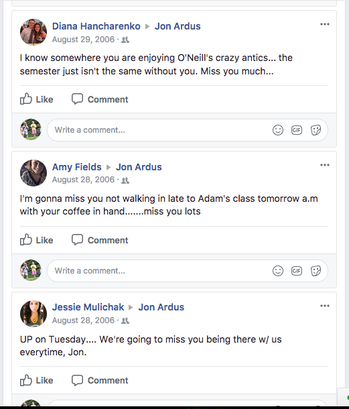 I’m updating my last will and testament with directions on how I want my memories preserved on social media. You should, too. Let me explain. In June, Facebook launched a new blog series titled “Hard Questions.” Essentially, the new series is a forum for open discussions about complex issues we’re facing on social media. “We hope this will be a place not only to explain some of our choices but also explore hard questions,” said Elliot Schrage, Vice President for Public Policy and Communications at Facebook. The first few entries focused on questions such as how to keep terrorists from spreading propaganda online, and how social media companies should monitor and remove controversial posts from their platforms. I wrote about that first “Hard Questions” entry in The Vindicator on June 28, 2017 (“Platforms team up to fight terrorism”). But last week’s entry was personal for me. It’s something I’ve struggled with since one of my students, Jon, died in a car accident over a decade ago: how to celebrate someone’s life on social media after they’ve died. The “Hard Question” was “After a person dies, what should happen to their online identity?” But I think it’s a much deeper, more complex question. So does Facebook, apparently. When I visit Jon’s page, I see occasional posts–messages sent directly to him as if he’s still reading them. It’s a page built on Facebook’s old interface, so some of the features no longer work. His profile image is gone. But the posts are still there. In fact, I posted in 2015: “This is my 10 year anniversary at YSU and I still reference stories about you and our conversations. Hope you’re living it up on the other side.” Knowing Jon, he probably is. Monika Bickert, Director of Global Policy Management at Facebook attempted to answer the hard question by providing a glimpse into the network’s role in preserving our online memories. Facebook found the perfect person to write this entry. It was raw and passionate, and to be completely honest–I got a little emotional: “In the days after my husband died, I kept sending him text messages... I needed to feel like I was still connected to him... pretending he was on the other side of the messages I was sending and would soon write back.” I encourage you to read her blog. Go to newsroom.fb.com and search “Hard Questions.” It’s moving. But more importantly, it provides a glimpse into the care Facebook takes with our memories after we’re gone. In short, the answer is this: like the rest of us, Facebook’s still trying to figure it out. If you’re concerned about what memories will be preserved after you’re gone, talk to others about how you want to be remembered–on social media, of course. Now, time to dust off that will.
0 Comments
Your comment will be posted after it is approved.
Leave a Reply. |
AuthorDr. Adam C. Earnheardt is special assistant to the provost and professor of communication in the department of communication at Youngstown State University in Youngstown, OH, USA where he also directs the graduate program in professional communication. He researches and writes on a variety of topics including communication technologies, relationships, and sports (with an emphasis on fandom). His work has appeared in Mahoning Matters as well as The Vindicator and Tribune-Chronicle newspapers. CategoriesArchives
July 2023
|
 RSS Feed
RSS Feed